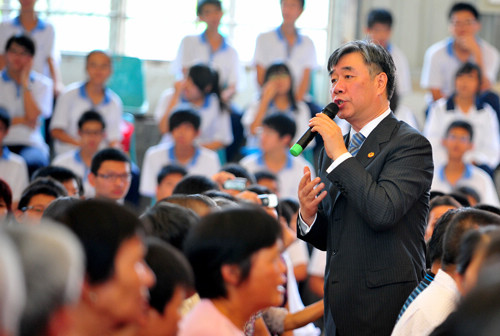|
 |
|
THE REFORM FIGURE: Gu Xin, Chairman of China Oriental sings as the group performs in a village in Fujian Province on October 14 (WEI PEIQUAN) |
While Chinese cultural performances are world renowned for their high standards, the difficulties local troupes face in generating adequate revenues from these performances has long stifled the development of China's best performance artists.
"We do have many talented artists, but almost all of them are working for state-owned troupes, where there hasn't been cut-throat competition," said Gu Xin, Chairman of the China Oriental Performing Arts Group (China Oriental), who is credited with successfully transforming his group from a stagnant performing troupe to a profitable one.
"I have given a lot of thoughts to why Chinese cultural performances aren't meeting the demands of the market," said Gu. "I don't think it is because we don't have the ability to create good performances. I think the problem really lies with the cultural administrative system."
Born in 1956, Gu used to be a tenor in the Jiangsu Provincial Song and Dance Ensemble and won several competitions both in China and abroad. In 1991, when he was at the peak of his career, the Jiangsu Culture Bureau was seeking a talented artist to become the director of the Jiangsu Ballet and Opera House.
Gu was given the position and displayed his versatile management ability as the Opera House's director. In 1995, he was selected to be Deputy Director of Jiangsu Provincial Department of Culture.
"I saw many problems with the state-owned ensembles, which were fettered with outdated systems," said Gu. "The rigidity of the system sapped performers of motivation and passion."
In 2001, Gu restructured the province's state-owned performing arts troupes to create the Jiangsu Performing Arts Group—the country's first major reform of a cultural institution.
The success of the reconstruction triggered the national reform of the cultural system. In 2003 major reforms were implemented in cultural institutions across the country. The State Administration of Radio, Film and Television, the Ministry of Culture and the General Administration of Press and Publication decided to transform cultural institutions into enterprises and encourage privatization.
"No reforms can be entirely smooth, especially when you touch upon a myriad of divergent interests," said Gu, who has attracted both praise and criticism for his role in the reforms.
"As the saying goes, it took a lot of courage to become the first crab eater," said Gu. "I feel I am more than that, I am like the first to eat a hedgehog."
Time would prove Gu right, and the reforms' success prompted the Central Government to extend it nationwide. Following the success of his initiative Gu also became the ideal candidate for overhauling the country's leading performing arts troupe—the Oriental Song and Dance Ensemble.
Founded in 1962 by then Premier Zhou Enlai, the Oriental Song and Dance Ensemble brought together leading artists who specialized in Asian, African and Latin American folk songs and dances. In those days, few foreign troupes toured China. The ensemble made up for the lack of foreign performances and also won international acclaim with its overseas tours.
Some of the ensemble's members, such as Zhu Mingying, Li Guyi and Cheng Fangyuan, became idols like today's pop stars.
Things changed with the reform and opening up when many similar troupes were set up, creating competition and ousting the ensemble from its top spot in the early 1990s. Some singers such as Cheng Fangyuan left the ensemble.
"The ensemble's name is golden but that didn't mean it was profitable," said Gu, who was appointed General Manager of China Oriental in January 2010.
| 